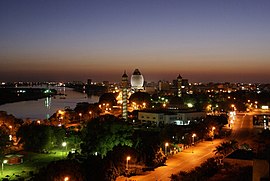Khartum
|
Khartoum الخرطوم al-Kharṭūm |
||
|---|---|---|
| City | ||

Khartoum at night
|
||
|
||
| Nickname(s): Triangular Capital | ||
| Khartoum's location in Sudan | ||
| Coordinates: 15°38′N 32°32′E / 15.633°N 32.533°ECoordinates: 15°38′N 32°32′E / 15.633°N 32.533°E | ||
| Country | Sudan | |
| State | Khartoum | |
| Government | ||
| • Governor | Abdel Rahim Mohammed Hussein | |
| Population (2014) | ||
| • Total | 5,185,000 | |
| Demonym(s) | Khartoumese, Khartoumian (the latter more properly designates a Mesolithic archaeological stratum) | |
| Time zone | EAT (UTC+3) | |
| • Summer (DST) | Not observed (UTC+3) | |
Khartoum (/kɑːrˈtuːm/ kar-TOOM) is the capital and largest city of Sudan and the state of Khartoum. It is located at the confluence of the White Nile, flowing north from Lake Victoria, and the Blue Nile, flowing west from Ethiopia. The location where the two Niles meet is known as "al-Mogran" (المقرن the confluence). The main Nile continues to flow north towards Egypt and the Mediterranean Sea.
Divided by the Niles, Khartoum is a tripartite metropolis with an estimated overall population of over five million people, consisting of Khartoum proper, and linked by bridges to Khartoum North (الخرطوم بحري al-Kharṭūm Baḥrī) and Omdurman (أم درمان Umm Durmān) to the west.
The origin of the word, "Khartoum", is uncertain. One theory argues that khartoum is derived from Arabic khurṭūm (خرطوم trunk or hose), probably referring to the narrow strip of land extending between the Blue and White Niles. Captain J.A. Grant, who reached Khartoum in 1863 with Captain Speke's expedition, thought the name was most probably from the Arabic qurtum (قرطم safflower, i.e., Carthamus tinctorius), which was cultivated extensively in Egypt for its oil to be used as fuel. Some scholars speculate that the word derives from the Nubian word, Agartum ("the abode of Atum"), the Nubian and Egyptian god of creation. Other Beja scholars suggest "Khartoum" is derived from the Beja word, Hartoom (meeting). Additionally, the dream interpreting magicians in Genesis 41:8 are referred to as חַרְטֻמֵּ֥י ([the] Khartoumei), suggesting that in ancient times the word already existed.
...
Wikipedia


